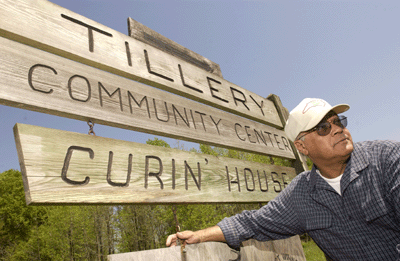Filed under: Education, Food, Politics, Sustainable Agriculture | Tags: Center for Documentary Studies, Duke, UNC
If you’ve read any of these blog posts, you’ll know that there is a lot packed into The Gillings Sustainable Agriculture Project. Of course, I’m new to research, but it’s still incredible to me that one project focused on local food is connecting economics, health, the environment, public policy, and community development. And now the project has taken it one step further by bridging the gap between historically rival schools – UNC and Duke University, through a class entitled “The Politics of Food.” This class is offered to both UNC and Duke students, who actually sit in a room together and have meaningful and productive discussions surrounding issues related to food systems. This class became a key element of this Gillings research project when Dr. Ammerman defined how much there was to be learned from the issues the project is studying and how much students’ work could contribute to the project itself.
The Politics of Food course is being offered this fall and is taught by Dr. Charlie Thompson, Education and Curriculum Director of The Center for Documentary Studies, an interdisciplinary educational organization affiliated with Duke. I am assisting Dr. Thompson with administration of the course and have the opportunity to join in the class each week. Though the class is located on the Duke campus, Tarheel fans make the trip over to The Center each Thursday. The class focuses on discussion of various readings and talks from different guest speakers, including growers, advocates for farm worker’s rights, researchers from this project, leaders in the North Carolina food movement, urban gardeners, union organizers, educators on the affects of pesticides and others. While in the class, students contribute to The Gillings Sustainable Agriculture Project by researching various organizations in North Carolina that are working for justice and change within the food system and beyond. Students have been asked to document their work, through essay, film or photography. Dr. Thompson makes clear to students that their work is not only for a letter grade. “Do your research and writing especially well,” the syllabus says, “because it will have a life beyond this course.”
A recent speaker to the class was Mr. Gary Grant, executive director of his community organization – The Concerned Citizens of Tillery. His parents began farming in the Tillery Resettlement Community in 1947. According to the National Organization to Save the Grant Family Farm over the next five decades, “officials in local USDA offices discrimaned against black farmers by delaying delivery of loans, requiring excessive collateral, and intimidating black borrowers.” Now the Grant family farm is threated with foreclosure. Mr. Grant spoke with an anger that was deepened by sadness, “My family would put in a loan and wait three, four, five months before we heard anything back. Meanwhile, white farmers just walked in and out of the office with their loans secured.” Indeed in 1999, Judge Paul Friedman signed a consent decree that effectively settled a long and bitter class action lawsuit against the USDA by black farmers alleging discriminatory lending practices. The lawsuit awarded damages to thousands of African-American farmers. Unfortunately, Mr. Grant told the class, obtaining actual recompense for the economic penalties they suffered has been difficult.
Dr. Thompson, who is also a writer and filmmaker, showed the class a film he produced entitled “We Shall Not be Moved,” which portrays the history of the Tillery citizens from their days of slavery, to sharecroppers, to landowners, and through the challenges they face today. ” Mr. Grant also talked about the school he used to teach at before it was closed down by the state due to budget cuts. Now children in his community have to travel by bus for over an hour to get to school each day. Families with young children don’t want to stay in Tillery, and he fears his community, once a vibrant place, will collapse.
Mr. Grant was a wonderful speaker, an impassioned man who an audience will not soon forget. His story is also a clear example of the political issues embedded in our food system. As I drove back to Chapel Hill that day, I thought about how progressive The Gillings Sustainable Agriculture Project is and how lucky I feel to be a part of it. This project doesn’t just stop at finding answers, but includes educating people about the complexities of what we eat and how it affects so much more than just our bodies. With knowledge, people can begin to decide how they would like to make a difference in our current food system. It can start as simply as buying an apple from a local farmer instead of one that was shipped from thousands of miles a way. Quoting from Dr. Thompson, “We are what we eat, but we are also what we do with the energy from what we eat.”

Gary Grant